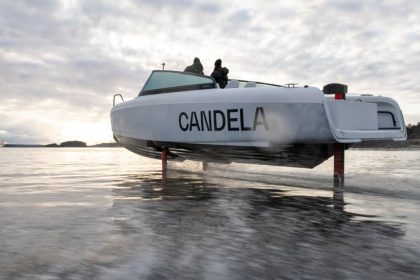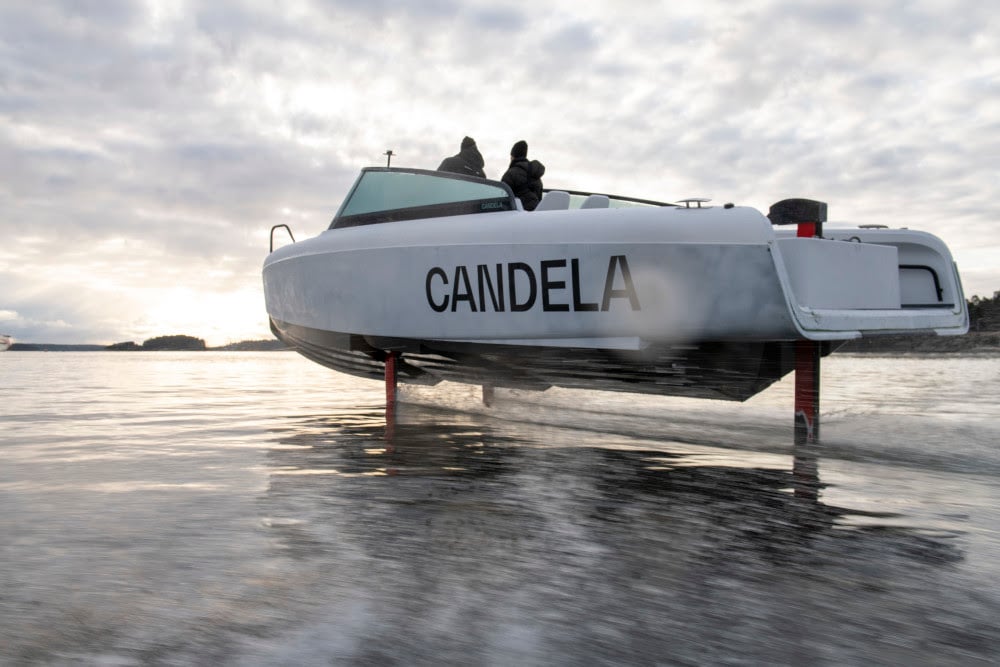
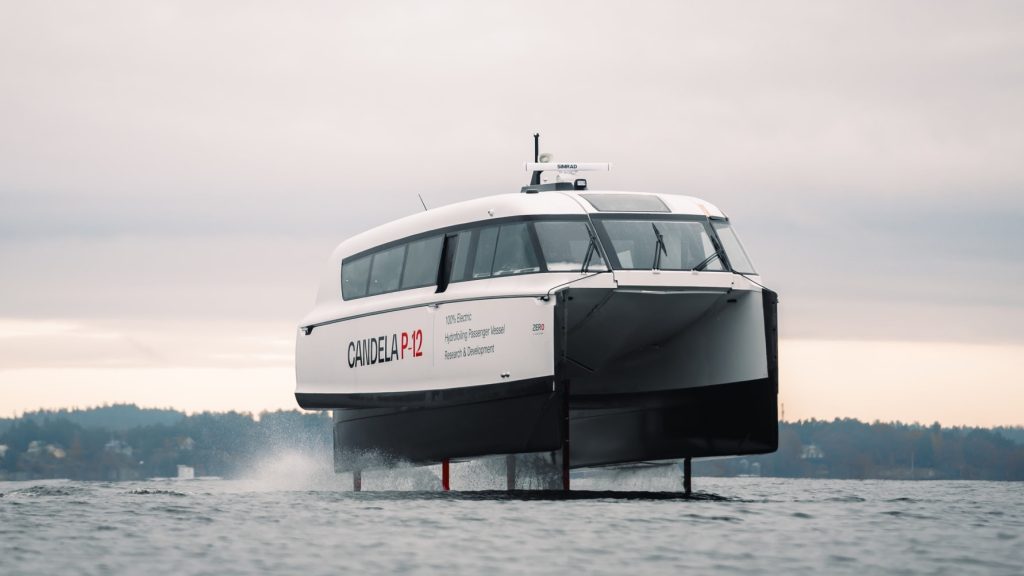
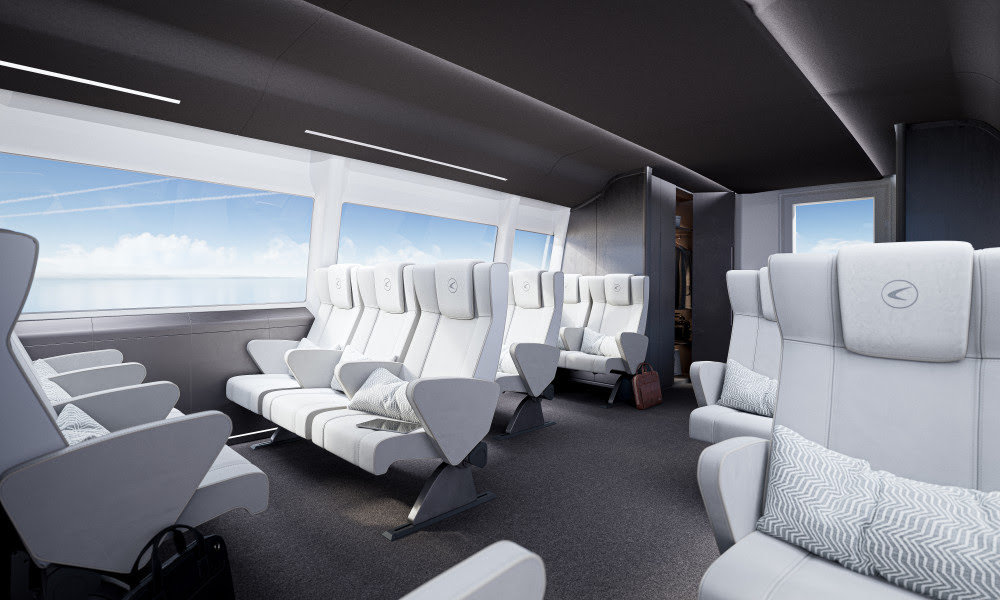
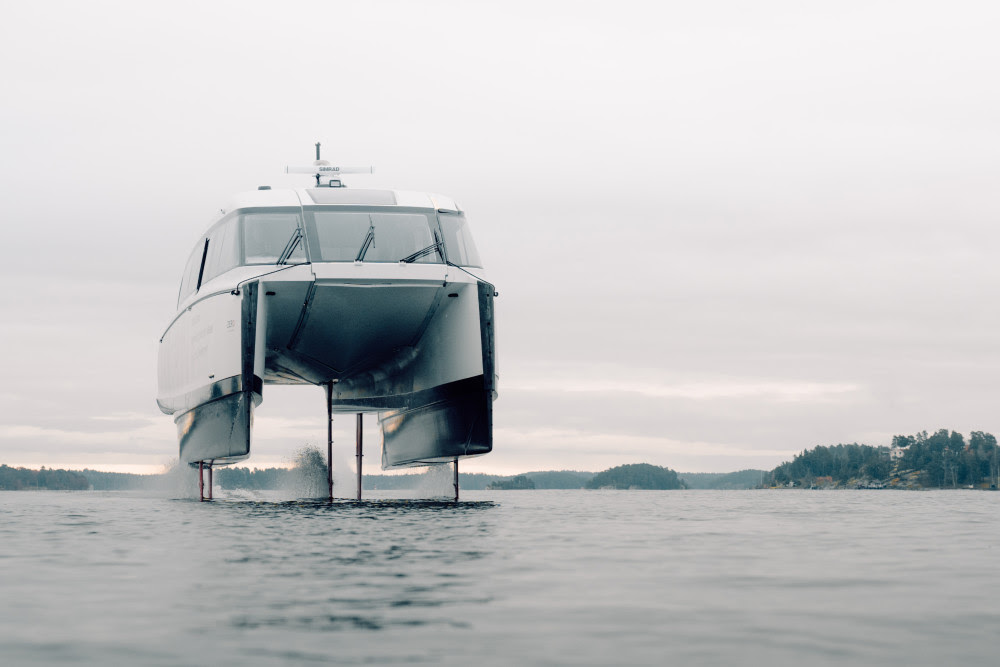
CANDELA, World’s Fastest Flying ELECTRIC SHIP takes off in Stockholm, costs 1.7million Euro (€1.7M)
…Climate compliant vessel designed in P-12 Shuttle, P-12 Business, P-12 Voyager
*Candela Technology AB is the world leader in hydrofoiling electric vessels
*Committed to accelerating shift towards a fossil fuel-free maritime future
*”With the P-12, we’re not just offering a faster, more comfortable electric alternative to fossil fuel-powered vessels, we enable operators to make the switch to sustainable vessels that are cost-effective and profitable, a crucial step towards clean oceans and lakes” -Erik Eklund, Candela’s Director for Commercial Vessels, emphasizes
*BY GEORGE ELIJAH OTUMU/AMERICA Senior Investigative Editor
THE world is about to witness a historic transformation and breakthrough like has never seen before in Marine Technology. Candela Technology AB, the world leader in hydrofoiling electric vessels has become a pacesetter to have invented the world’s fastest flying electric ship-climate compliant which costs the sum of €1.7M price point competitive with ICE contenders, readily available in three versions.
After completing successful flight tests, Candela P-12 enters serial production in Stockholm. The world’s fastest electric passenger vessel is anticipated to cut operational costs by 50% compared to diesel vessels, speeding up the shift to sustainable transportation on water. On its inaugural route, it will slash commuting times in half, thanks to an exemption from speed limits.
In a breakthrough advancement for sustainable maritime transport, Swedish tech company Candela Technology AB announced today that the Candela P-12, the world’s first electric hydrofoiling passenger vessel, has successfully completed test flights in Stockholm. It is now progressing into serial production at Candela’s Rotebro factory.
Corroborating this invention in a press statement sent to our Editorial Board at Naija Standard Newspaper Inc USA, Max Carlgren, the firm’s Public Relations & Communication Manager explained that P-12 employs computer-guided hydrofoils to elevate its hull above water friction, “When foilborne at speeds over 18 knots, the Candela P-12 consumes 80% less energy than traditional high-speed vessels. This innovation addresses the primary challenges that have hindered the widespread adoption of electric, fast vessels to date: limited range and slow speeds due to the excessive energy consumption of conventional hulls.
“During its first flights, Candela P-12 confirmed its top speed of 30 knots, a record for electric passenger vessels. With a range of up to 50 nautical miles, it is also the first electric ship with the practical endurance to cover most coastal transport needs. Tests also confirmed the minimal wake, which opens for exemptions from speed limits, as the P-12 will neither erode coastlines nor damage docks and moored ships, even at full speed.”
Maritime transport represents 3% of global CO2 emissions, a figure projected to grow to 13% in the coming decades if no action is taken. High hopes are therefore placed on electric vessels, with the market for electric ships estimated to hit US$ 31.48 billion by 3034.
Still, electric vessel adoption today is extremely low, even on urban and coastal waterways, due to their high cost and limited performance.
Candela is committed to accelerating the shift towards a fossil fuel-free maritime future. Besides its game-changing range and speed, the P-12 is engineered to offer similar or lower initial investment costs for operators while boosting profits compared to traditional Internal Combustion Engine (ICE) vessels.
Priced at €1.7 million, the 30-seat Shuttle variant of the P-12 matches the cost of similar-sized ICE vessels and is priced significantly lower than other electric options. This is possible thanks to its hydrofoil efficiency, which enables an extended range from a modest 252 kWh battery. It is combined with streamlined serial production that leads to industry-low overall unit costs.
Erik Eklund, Candela’s Director for Commercial Vessels, emphasizes: “With the P-12, we’re not just offering a faster, more comfortable electric alternative to fossil fuel-powered vessels. We enable operators to make the switch to sustainable vessels that are cost-effective and profitable, a crucial step towards clean oceans and lakes.”
Once in service, operators can expect reduced ‘fuel’ costs by up to 90% compared to diesel vessels. The C-POD motors require minimal servicing, and the vessel is designed for single crew operation, which further slashes costs.
In total, the P-12 is expected to cut costs per passenger kilometer by up to 50%, achieving a similar operational per-passenger economy as a hybrid electric bus.
A Better Passenger Experience:
Candela’s pursuit of innovation extends beyond the hydrofoil system. The tech company’s engineers have reimagined every element of vessel design, from maintenance to docking, to provide a superior experience.
Passengers enjoy swift and easy boarding via an extendable, automatic bow ramp, adjustable for docking at varying quay heights from 0.3 to 1.8 meters. This versatility enables the P-12 to serve a multitude of routes globally without the need for dock alterations.
Each stop’s turnaround time is under 2 minutes, courtesy of the C-POD motors’ thrust vectoring for nimble maneuvering—even allowing the vessel to move sideways when required.
Once flying, the digital flight control system compensates for waves, side wind, and current by adjusting the hydrofoils’ angle of attack 100 times per second, providing a smooth ride free from sea sickness-inducing pitching and slamming. This system, reminiscent of technology found in modern jet fighters, has been developed by Candela’s engineers since 2016 and fine-tuned in the company’s leisure vessels, the C-7 and C-8.
Three Versions:
The P-12 is a versatile platform designed to accommodate an array of use cases and clients, from public transport to bespoke private shuttles.
It is available in three variants: the P-12 Shuttle, P-12 Business, and P-12 Voyager.
The Shuttle configuration seats 30 passengers and sets the benchmark for sustainable commuting with the lowest operational costs in the industry. Allocated space for bicycles (along with strollers and wheelchairs) encourages the integration of cycling with public transport.
The Business version features a premium interior with seating for 12 to 20 passengers (and plenty of suitcases), and the highly adaptable Voyager version offers customers flexibility in interior design, catering to both private leisure and commercial clients.
“The P-12 is a platform that will cater to a vast range of clients. Whether it’s public transport fleets, VIP services, or private customers, it will revolutionize how we travel on water,” says Gustav Hasselskog.
In a pilot, the Candela P-12 Shuttle is set to join Stockholm’s public transport network in 2024, reducing the Ekerö suburb-city center commute from 55 to 25 minutes, surpassing cars, buses, and current diesel ferries in speed. This is possible by obtaining an exemption from the city center’s speed limits thanks to the vessel’s minimal wake.
In Stockholm, as in many waterfront cities, waterborne traffic has been dwindling as buses and cars provide quicker and more affordable transport. The P-12 aims to reverse this trend.
“Today, in many cities, congested roads are common while waterways — humanity’s oldest transport infrastructure — remain underutilized for rapid commuting. The P-12 will let you use these waterways as green highways, enabling fast intra-city connections. Often, the quickest route is by water,” states Gustav Hasselskog.
Candela P-12 Specs:
Length: 11.99 meters
Beam: 4.5 meters
Payload: up to 30 passengers
Battery: 252 kWh
Motors: 2 x Candela C-POD MAX, 340 kW total peak power
Charging: 175 kW DC charging, overnight AC charging
Top Speed: 30 knots
Service Speed: 25 knots
Range: 40 to 50 nautical miles at 25 knots depending on version and load
Price €1.7M for Shuttle configuration
For the record, Stockholm-based Candela Technology AB is the world leader in hydrofoiling electric vessels. The company was founded in 2014 by engineer and business leader Gustav Hasselskog with the mission to accelerate the world’s transition to fossil fuel-free lakes and oceans by developing electric vessels that outperform those powered by fossil fuels.
Candela’s watercraft have wings (hydrofoils) that lift the hull above the water and reduce friction, using 80% less energy than conventional ships at high speed. This technology allows for long-range water travel solely on battery power, a first in the industry. Candela’s hydrofoils also enable operators to transition to sustainable fleets by providing up to 50% lower operational costs.
At the heart of Candela’s hydrofoil tech stack is the Flight controller, which automatically stabilizes the vessel during flight by regulating the foils, using sensors that gauge wave height and wind speed, among other factors. Even in rough weather, passengers experience 90% less g-forces than they would on a traditional boat. All Candela vessels are fully connected and receive over-the-air updates.
After five years of research and development, Candela began producing the world’s first electric hydrofoil leisure boat in 2019, the Candela C-7 open “roadster of the seas”. This was followed in 2021 by the high-volume market Candela C-8, which will be delivered to the first customers in spring 2023. Over 150 C-8 units have been sold to date, and the vessel has been lauded as a “game changer” by Motorboat and Yachting magazine, winning numerous awards including the 2022 European Powerboat of the Year award for its superior seakeeping, long range, and high speed.
In 2023, Candela is launching its first commercial vessel, the Candela P-12 Shuttle ferry. It is poised to set multiple world records for being the fastest and longest-range electric ship ever built, with a top speed of 30 knots and a range of up to 60 nautical miles. It will also be the most energy-efficient fast ship ever made in its size class. Substantial operational cost savings are expected. The first unit is water launched during November summer 2023.
Candela is a technology company with headquarters in Stockholm, Sweden, employing over 200 engineers, technicians, and production staff. The company develops the entire tech stack, from the C-POD motor to the control system and carbon fiber hulls, in-house. Candela’s two wholly owned factories in Stockholm, Sweden, produce the Candela C-8 and P-12 vessels. The company also has leisure boat resellers in 12 countries and wholly owned sales offices in San Francisco, USA, and Cannes, France.
SUPPORT OUR INVESTIGATIVE JOURNALISTS & JOURNALISM:
CERTAINLY, Good journalism costs a lot of money. Without doubt, only good journalism can ensure the possibility of a good society, an accountable democracy, and a transparent government. We are ready to hold every corrupt government accountable to the citizens. To continually enjoy free access to the best investigative journalism in Nigeria, we are requesting of you to consider making a modest support to this noble endeavor.”
By contributing to NAIJA STANDARD NEWSPAPER, you are helping to sustain a journalism of relevance and ensuring it remains free and available to all without fear or favor.
Your donation is voluntary — please decide how much and how often you want to give. For offline donation, email: letters@nigeriastandardnewspaper.com or call +2348037128048 (Nigeria) or +16825834890 (United States of America)


